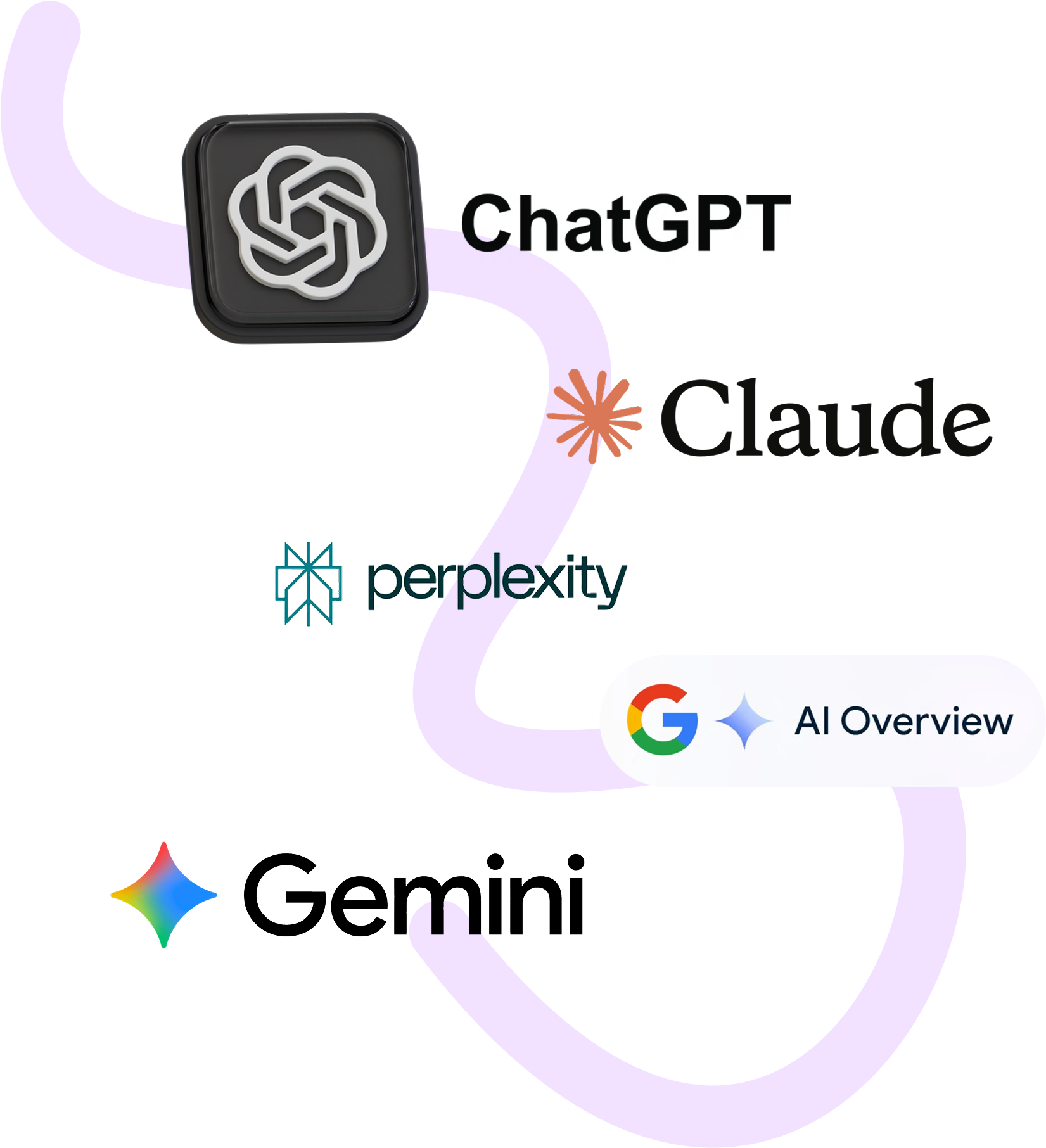

Forward-thinking companies are discovering that traditional SEO remains important for search visibility, but AI search optimization represents the next generation of digital marketing. While traditional SEO is focused on ranking web pages, AI optimization determines whether your business gets recommended as the solution when prospects ask AI platforms about your industry.
The opportunity is more complex and valuable than most businesses realize.
AI search optimization involves platform-specific strategies and a deep understanding of how artificial intelligence systems evaluate and cite content. Companies implementing comprehensive AI strategies are positioning themselves as the authoritative voices in their categories while competitors remain invisible in AI conversations.
Here's what the most successful companies understand about AI optimization, why this represents a massive strategic opportunity, and what this means for your business.

The biggest opportunity most companies haven't recognized is the multi-platform nature of AI search. Each major AI platform operates with different algorithms, citation preferences, and content evaluation criteria:
AI platforms are becoming integral to business research processes across organizations, creating new pathways for prospect discovery and evaluation.
Companies implementing comprehensive AI visibility strategies capture qualified prospects across the entire AI research ecosystem. When prospects research solutions across multiple platforms, optimized companies maintain consistent authority positioning while competitors appear fragmented or invisible.
The fundamental difference between traditional SEO and AI optimization isn't just technical. It's philosophical.
Traditional SEO: Get found in search results so users click through to your website.
AI Optimization: Get cited as the authoritative answer so users receive your expertise directly.
When someone asks ChatGPT "What's the best solution for [your category]?" they don't get a list of search results to compare. They get a direct recommendation with specific reasoning about why that solution works best.
"Companies positioned as the cited authority capture this attention without competition for clicks."
This doesn't mean traditional SEO becomes irrelevant. The most successful businesses now need both traditional search visibility and AI recommendation authority. Perfect Google rankings don't automatically translate to AI visibility because AI platforms prioritize content structure, expertise indicators, and citation-worthiness factors that have different optimization requirements.
The first-mover advantage in AI search optimization isn't theoretical. It's playing out in real business results right now.
AI adoption is accelerating across organizations, creating substantial advantages for businesses that establish authority early. As more professionals integrate AI tools into their research and decision-making processes, the platforms themselves become increasingly valuable channels for business visibility.
AI optimization creates business value beyond direct lead generation. Companies cited frequently by AI platforms benefit from enhanced reputation, stronger industry positioning, and accelerated thought leadership development.
Organizations implementing AI strategies early maintain sustainable competitive advantages as the technology matures and becomes more integral to business research processes. This reputation effect compounds over time as AI systems reinforce successful citations with additional recommendations, creating momentum that newer entrants find difficult to overcome.
Each AI platform operates with different algorithms, citation preferences, and authority evaluation criteria. Understanding these nuances requires technical expertise and systematic testing approaches that go far beyond traditional SEO tactics.
The opportunity is significant but time-sensitive. Early adopters are establishing AI authority positions that will be increasingly difficult for competitors to challenge. The businesses that act now will own the AI conversation in their categories for years to come.
The question isn't whether AI search optimization matters. It's whether your business will be visible when prospects ask AI platforms about solutions like yours.
AI-powered search is rapidly evolving across all major platforms, each developing distinct approaches to information synthesis and source attribution. Understanding these platform-specific behaviors is crucial for comprehensive AI optimization strategies.

ChatGPT often synthesizes answers without showing inline citations by default (unless browsing tools are enabled), so brand recognition and topical authority strongly influence whether you're named or described in responses. When users ask for business recommendations or solutions, ChatGPT's responses often reflect the prominence and expertise associations established during its training process.
Google's AI ecosystem, including both AI Overviews and Gemini, blends traditional search ranking signals with AI synthesis, often pulling from sources that already rank well organically. This creates opportunities for businesses with strong SEO foundations while requiring additional optimization strategies beyond traditional search approaches.
According to Semrush analysis, AI Overviews appeared in 13.14% of U.S. desktop searches in March 2025, up from just 6.49% in January. Pew Research finds users are roughly half as likely to click results when AI summaries appear (8% vs. 15%), with only 1% of sessions producing clicks on cited sources within the AI Overview itself.
Perplexity stands out for its explicit citation model, directly linking to sources while favoring content that provides clear, factual information with strong supporting evidence. This platform's real-time search capabilities mean current content and up-to-date information carry significant weight in citation decisions.
Claude emphasizes analytical depth and often cites sources that demonstrate nuanced understanding and comprehensive coverage of topics. The platform appears to favor content that provides thorough analysis rather than surface-level information, making expertise demonstration particularly valuable.
Companies that get cited capture attention from prospects who never visit competitor websites. Companies that don't get cited become invisible to users who rely on AI summaries for decision-making.
Success requires understanding that each platform values different authority indicators. Some prioritize recency and real-time information, others favor established domain authority, and others focus on content depth and expertise demonstration.
The complexity of multi-platform AI optimization requires a systematic approach that goes beyond traditional SEO tactics. RankScience has developed a comprehensive framework specifically designed for AI search visibility across all major platforms.

Our proprietary methodology combines three distinct but interconnected strategies: Generative Engine Optimization (GEO), Large Language Model Optimization (LLMO), and Answer Engine Optimization (AEO). The academic foundation for Generative Engine Optimization comes from <a href="https://collaborate.princeton.edu/en/publications/geo-generative-engine-optimization" target="_blank">Princeton's GEO paper, published in the KDD '24 proceedings</a>, which reported up to 40% improvements in visibility across evaluated query sets.
Generative Engine Optimization (GEO) focuses on strategic platform optimization, understanding how each AI system evaluates and selects sources for citations. This involves content structuring, authority signal optimization, and platform-specific technical requirements that vary significantly between ChatGPT, Claude, Perplexity, and Google's AI ecosystem.
Large Language Model Optimization (LLMO) addresses content structuring for AI understanding, ensuring your expertise gets properly interpreted and weighted by language models. This goes beyond traditional keyword optimization to semantic meaning, context clarity, and expertise demonstration that AI systems can recognize and value.
Answer Engine Optimization (AEO) handles direct answer formatting and citation-worthiness optimization. This involves structuring content so AI platforms not only find it relevant but present it prominently in their responses, increasing both citation frequency and positioning within AI-generated answers.
Platform algorithms change frequently, and what works for Google AI Overviews may not work for Perplexity's citation model or ChatGPT's recommendation patterns. Our integrated approach adapts to these platform-specific requirements while maintaining consistent authority positioning across the entire AI search ecosystem.
Ongoing client implementations continue to refine this integrated approach, building practical understanding of what drives citation success across different platforms and industries. The framework provides measurable results through systematic testing and platform-specific performance tracking that most marketing teams lack the infrastructure to implement independently.
The window for establishing AI authority is narrowing. As more businesses recognize the importance of AI search optimization, the competitive advantages of early adoption become increasingly valuable. The businesses implementing comprehensive AI visibility strategies today will maintain sustainable market positions as AI platforms become the primary research tools for B2B decision-makers.

Category Creation and Thought Leadership Positioning
Technical Foundation for AI Platform Recognition
Direct Citation and Answer Pickup

Schedule a free 30-minute consultation to discuss your specific situation and discover which AI platforms your prospects are using to research solutions in your industry.



RankScience LLC
2443 Fillmore St #380-1937,
San Francisco, CA 94115
© 2025 RankScience, All Rights Reserved